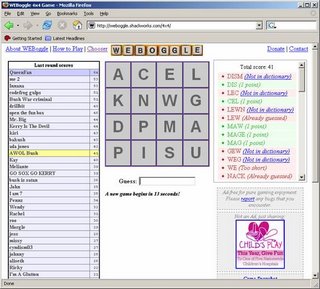And then there was Weboggle.
It's a great web adaptation of Boggle. It's simple and elegantly done. It's fun and it's free. But the competition is fierce. You can take everyone on or you can play in teams. If you love words, you should PLAY THIS GAME.
 Pick a handle and attach it to a sharp pointy idea
Pick a handle and attach it to a sharp pointy ideaThere is nothing deep about playing Weboggle, but a while back I was musing over the game handles players were choosing. The freedom to adopt any handle allows WebBoggle users to assert a kind of agency, to link themselves with a political movement, a trend, an emotion or just about anything. The screen on the left is fairly typical: players include “Bush War Devil”, “Kerry is Satan”, “AWOL Bush”, “Go SOX Go Kerry”, etc. Some players log in with web site addresses (hoping other users will visit their URLs). Others use self-disparaging (or aggrandizing) names. Nothing new here -- the web has always been about alter egos and virtual (risk free) grandstanding. For me the interesting aspect of using these handles is in linking the player’s message with their skill level. A pro-Bush player who wins consistently seems to mean more than a similar name that languishes in the bottom half of the score box. I don’t really believe this, but it “feels” like it is true. In Colbertian terms, there seems to be a quality of truthiness in Weboggle handles. I could add that it seems as if anti-Bush players seem land in the top five positions more frequently. But this could be my own subjective bias -- I am blinded by the truthiness. Perhaps all of this says something about the culture of winning that permeates our world and what it does done to our language. We compress complex sets of ideas into “platforms”, talking points, sound bites, slogans and even single words: flip-flop, AWOL, global test, etc. A picture is worth a thousand words, but a single word can be worth a million votes. Or so it would seem. On the other hand, looking for meaning in Weboggle scores is probably at least as silly the thought that exercising one’s “agency” by playing Weboggle could ever be a meaningful political act.
No comments:
Post a Comment